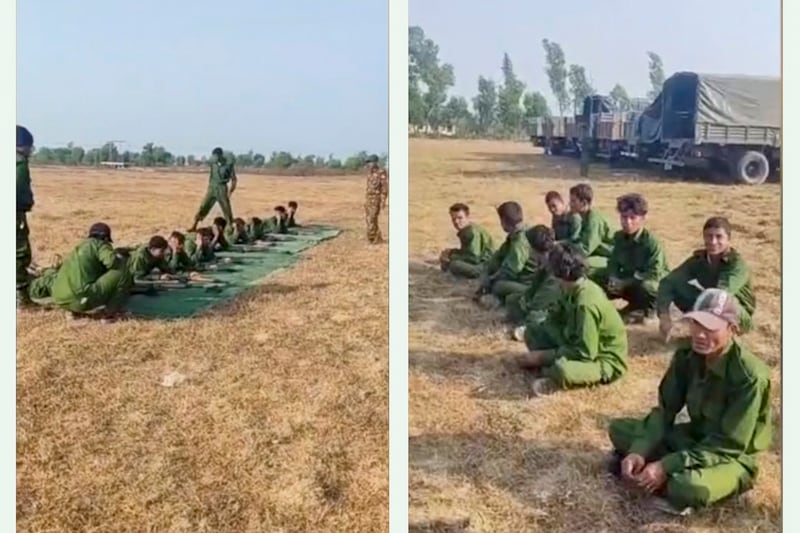Thailand has placed no restrictions on educational visas for Myanmar nationals, its foreign ministry said Wednesday, despite reports of students being rejected on the grounds that they must apply from outside the country.
Claims of changes to Thailand’s educational visa application process follow the imposition of a military draft by Myanmar’s junta aimed at shoring up troop shortages brought on by losses to rebel forces. Many of those eligible for conscription have fled Myanmar’s cities for rebel-held territory or leave the country, rather than fight for the junta.
Last week, reports surfaced that education visas would no longer be issued to Myanmar nationals who plan to attend Thai language schools. That prompted speculation that Thailand had taken this step to keep Myanmar citizens from flooding into the country.
When RFA Burmese contacted the Thai Embassy in Yangon, officials said the Thai government had made no policy changes to the educational visas for Myanmar nationals wanting to study in Thailand. All visas are available to applicants, provided they can submit the required documents, it said.
But students, visa servicing agents and schools in Thailand told RFA that the Immigration Bureau had rejected applications from Myanmar citizens who were enrolled in schools and universities in the northern Thai city of Chiang Mai.
Kidnapped to join army
Meanwhile, reports are spreading that junta troops are abducting young men for conscription.
On Tuesday, residents and members of the People’s Defense Force, or PDF, in Myanmar’s Magway region told RFA that in the month and a half from the beginning of April to mid-May, junta troops arrested more than 350 draft-eligible men in the townships of Natmauk, Aunglan and Yenangchaung. The detainees were sent to nearby military schools for training, they said.
Residents told RFA that in several cases no summons or arrest warrants were issued, and junta troops “collaborated with administrative and district clerks to compile lists [of young men to detain] themselves.”
Some of the young men were released after paying money to the troops, they said, although it was not clear whether the payment was a bribe or a fine.
RFA tried to reach Myo Myint, the junta’s minister of social affairs and spokesperson for Magway region, and junta spokesperson Maj. General Zaw Min Tun for comment on the arrests, but was unable to do so.
Student visas
Myanmar nationals learning Thai, English and other languages have long used language schools in Thailand to apply for one-year student visas after entering the country on a tourist visa.
Some universities will sponsor students for a four-year visa, depending on the program, according to Burmese residents in Thailand.
There are more than 34,000 international students in Thailand, according to the country’s Ministry of Higher Education. While more than 21,000 are from China, those from Myanmar rank second, at more than 3,700.

While the exact number of Burmese applicants for educational visas is unknown, thousands are believed to have applied for the one-year educational visa at the Chiang Mai Immigration Bureau.
One young Burmese student who inquired about his educational visa application to Chiang Mai University and six other private language schools was told that he could not apply within Thailand.
Instead, school officials said, he would need to apply for the visa by presenting school recommendation letters to Thailand’s embassies in neighboring countries such as Myanmar, Laos and Cambodia. Like others interviewed for this report, he asked to remain anonymous due to security concerns.
While the schools said they had not received an official directive from Thailand’s Immigration Bureau outlining restrictions on educational visas, the application process had been changed, “likely due to the ongoing political situation in Myanmar.” They said it was unclear when the policy might be reversed.
Some visa service agents RFA spoke with also said that despite a lack of a formal notice, the Immigration Bureau had given instructions outlining the new visa restrictions.
Attempts by RFA to contact Thailand’s Immigration Bureau via email and telephone for more details went unanswered.
Conflicting reports
RFA also received conflicting reports about whether the restrictions were gender-based. Some students and schools said that only men are required to apply outside of Thailand, while women could continue to apply within the country.
But a young Burmese woman studying language at a Buddhist university in Chiang Mai said that her application was rejected and she was told to leave the country to reapply.
“I was advised to reapply in one of four foreign countries,” she said. “This policy [of visa restrictions] covers both males and females. While the schools will support all the required documents [to apply outside of the country], I am still waiting to get them.”
A male student named Thura, who is living in Chiang Mai, told RFA that it has always been easier to apply for a student visa outside Thailand.
“I have experience applying for the visa both inside and outside Thailand,” he said. “My school gave me a document to apply for my visa abroad. I applied on my own, outside Thailand, as I could not do it inside Thailand. This was the educational visa application process in Thailand previously and it's the same as the current policy.”
Amid reports of the student visa restrictions in Thailand, the Chiang Mai Immigration Bureau announced Tuesday that authorities had arrested 27 Myanmar nationals living in the city without legal documentation.
Police raided six locations where foreign workers were staying in Changklan sub-district on Monday and arrested those who did not have valid residence permits, the bureau said.
Attempts to reach the Chiang Mai Immigration Bureau for comment on the arrests went unanswered Wednesday.
Translated by Aung Naing and Kalyar Lwin. Edited by Joshua Lipes and Malcolm Foster.
